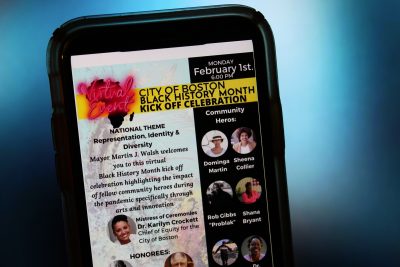While the pandemic still prevents large in-person gatherings, organizations across Boston will honor Black History Month by hosting educational and cultural events virtually.

The City of Boston is centering this month’s events around a theme of representation, identity and diversity, according to a press release from the Mayor’s Office.
The Boston Public Library will host a series of online book talks with Black authors, while the city’s Black Employee Network hosts panel discussions on topics ranging from increasing quality of life for Black residents in Boston to uplifting youth voices — all remotely.
Massachusetts Historical Society will also take part in the month-long holiday by holding events on the state’s history of protests and activism within the Black community, said Gavin Kleespies, director of public programs at MHS.
“The number of protests that happened this year, not all specifically related to African American activism, but just general protests, it all made it seem more relevant,” Kleespies said. “But it’s also an interesting topic, so I think that it’s very possible we would have gotten to some of that.”
“Protest and Citizenship: Revisited,” an MHS event taking place Feb. 25, considers the role of protesting in the democratic process and active citizenship, Kleespies said. The topic was first discussed at an MHS panel in March 2018.
“We’ve been interested in protests for a long time, it’s not just recent,” Kleespies said, “but the amount of protests that happened in America in the past 12 months certainly has made it seem like something that’s very worth looking at now.”
Harvard University’s Radcliffe Institute for Advanced Study will consider a similar topic in one of its virtual panels: “Protest as Politics,” which takes place Tuesday.
“We would very likely be holding this program even without the protests, given the Institute’s commitment to issues of equity and justice, but recent events have made the topic and the speaker all the more timely and important,” Rebecca Wassarman, executive director of academic ventures and engagement at the Radcliffe Institute, wrote in an email.
While the pandemic has moved both of these events online, Kleespies said it has also provided different opportunities for the MHS — speakers from across the country can now contribute without travel.
“It’s nice to be in the same room with people, it’s nice to have interactions on a personal level, but it’s also great to be able to get Hasan Jeffries to be a part of your program,” Kleespies said, referencing a “Protest and Citizenship” speaker. “He might think twice if he had to fly from Ohio.”
Akunna Eneh, programs and community outreach librarian of the Roxbury branch of BPL, said the library is still trying to reach out to the local Black community — who she said may feel disconnected and frustrated with changes taking place in Nubian Square — and allow them to feel connected even if the building is closed.
“We’re trying to make sure people can still touch and feel us in a way,” Eneh said. “We’re still here for you and we want to be here for you.”
Eneh said BPL aims to take their programs further than the “surface level” and instead highlight a deeper connection to history — they hope to achieve that by inviting Black authors who can speak on their own experiences, rather than on behalf of someone else.
“This year, for many of us, the movement around Black Lives Matter is on all of our minds,” Eneh said, “and so there’s been more discussion of like, ‘what can we do to make this a really engaging Black History Month even without being able to meet our patrons in real life?’”
However, the virtual events still pose a challenge for neighborhoods who have limited access to the internet or a computer — especially in the Roxbury, Jamaica Plain and Hyde Square neighborhoods, Eneh said.
“We had to move a lot of our things online,” Eneh said, “and that’s hard because a lot of our patrons don’t have their own devices or don’t have stable wifi.”
A solution to this issue, Eneh said, has been “half-and-half” events to provide more in-person experiences — such as arts and crafts and book bundles — while also appealing to different groups of patrons.
Throughout the month, education on the different aspects of the history of Black Americans is the most important takeaway.
Kleespies said their programming is intended to reach a broad set of topics related to the history of African Americans.
“The main overriding theme is the agency of people in the past, and how people have used different opportunities and different challenges to alter the course of where things were going,” Kleespies said.
The public can utilize the BPL this month to explore topics such as Black feminism, the civil rights movement and the experience of being Black in the modern United States, Eneh said.
“The public library is a place for you to be a scholar, in a way, of your own experience,” Eneh said. “The library is a conduit for that kind of scholarship and not on the ivory-tower level, but on the everyday human experience level.”






















































































































